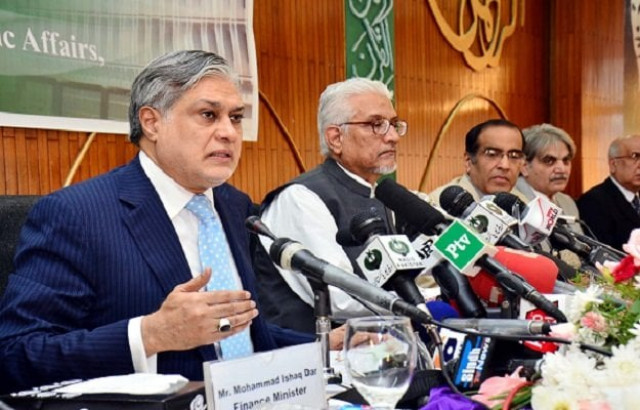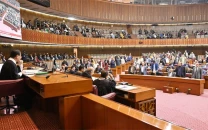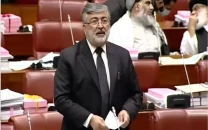Aggressive Dar defends budget as ‘pro-poor’
Minister rules out including circular debt in budget.

Finance Minister Ishaq Dar addressing a press conference. PHOTO: EXPRESS
Faced with virulent criticism from populist journalists over the federal budget for the fiscal 20115-16, Finance Minister Ishaq Dar was aggressively defensive in his post-budget press conference on Saturday, going so far as to ask security personnel to throw one reporter out before facing a mutiny from the journalists in the room and backing down.
At the traditional annual post-budget press conference, Dar’s defence of the government’s proposals was overshadowed by his aggressively agitated attitude towards the questions he received from journalists, many of which were highly populist in nature. At one point, he directed his staff to throw one journalist out of the room before having to soften his stance after the rest of the reporters in the room threatened to boycott the press conference in protest of his behaviour.
A key controversy appears to have been Dar’s decision to defend not including the inter-corporate circular debt of the energy sector as part of the budget. The controversy arises from the fact that when the Nawaz administration took office in June 2013, it issued close to Rs500 billion worth of treasury bonds to clear the liabilities of the state-owned power sector that arise from rampant electricity theft. The goal of that move was to financially jumpstart the power sector and to reduce the amount of power outages in the country while the government introduced tough reforms like raising power tariffs and reducing subsidies.

However, two years later, with improvement in electricity supply only marginal at best, calls have grown in some segments of the political spectrum to continue what was originally supposed to be a stop-gap measure: get the government to finance circular debt out of its budget.
At the press conference on Saturday, Dar emphatically ruled out that option. “Circular debt has nothing to do with the budget,” he said. “Those who propagate the idea to include it in the budget lack an understanding of the budget.”
Dar said that at present, circular debt was around Rs270 billion or 1% of the GDP and this should be settled by the water and power ministry against its receivables. The minister said the government will only pick tariff differential subsidies in the budget and for that purpose it has allocated Rs118 billion in the new budget.
Dar also rejected the idea that the budget was ‘pro-rich’ and insisted that it was a ‘pro-poor budget’, citing taxation on rich people in his defence. He said the government increased capital gains tax rates, dividend rates and imposed a ‘super’ tax on individuals and companies earning more than Rs500 million annually.
For low-income people, Dar cited the fact that allocations for the Benazir Income Support Programme have been increased to Rs102 billion. He said the government also reduced the income tax rate on those whose annual income is in the range of Rs400,000 to Rs500,000. He said interest-free loan to setup solar tube-wells was also a pro-poor measure.
The minister insisted that “packaged yogurt was not poor man’s diet” and only rich people use this dairy product. The government imposed a sales tax on many packaged dairy products in the budget.
He said the 0.6% tax on all banking instruments, including on cheques, will force people to “either stash their money in sacks or at least pay 0.6% tax.”
While the finance minister tried to defend the Rs267 billion regressive taxation in the budget, some experts including those belonging to the ruling party, termed the budget unrealistic. “The 2016 budget is based on fragile and unrealistic assumptions and like 2015, there may be a need for a series of mini-budgets to meet the quarterly quantitative performance criteria of the IMF,” according to budget analysis done by the Institute of Policy Reforms, an Islamabad-based think tank run by industrialist-politician brothers Humayun and Haroon Akhtar, the latter of whom is now part of the Nawaz administration.
The IPR said the new budget’s focus continues to be on fiscal consolidation under the aegis of the ongoing IMF programme. “This is to be achieved by a combination of wishful thinking, involving over-optimistic projections, and through the adoption of some creative accounting techniques,” he said.
The IPR has projected that in order to be able to slash power subsidies to Rs105 billion, as the current budget proposes, the government will have to raise electricity tariffs by 15% to 20%, sooner or later.
Published in The Express Tribune, June 7th, 2015.



















COMMENTS
Comments are moderated and generally will be posted if they are on-topic and not abusive.
For more information, please see our Comments FAQ